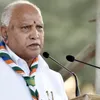Coronavirus: BYD Company opens largest face mask plant
The plant is now running at full capacity and is able to produce 50 lakh masks and three lakh bottles of disinfectants per day, the company said in a statement.
BYD Company, headquartered in China, on Friday said it has unveiled the largest face mask plant, aimed at meeting the demand in the wake of the coronavirus outbreak.
BYD is proud to announce that it has created the world's largest mass-produced face mask plant. The plant is now running at full capacity and is able to produce 50 lakh masks and three lakh bottles of disinfectants per day, a company spokesperson said in a statement.

China-based BYD company announced the setting up of the world's largest face mask plant
The company said the plant would allow the firm to alleviate severe shortage that has affected hospitals and agencies across China in the wake of COVID-19 outbreak.
A special task force was appointed by BYD chairman and president Wang Chuanfu, consisting of leaders from various divisions and more than 3,000 engineers were involved in research and development, design among others.
With the company making about five to 10 new mask-producing machines on a daily-basis, the number of masks produced by BYD was increasing from approximately three lakh units to five lakh units per day.
BYD currently has a total production capacity of 50 lakh masks per day, it said.
Recently IIT-Delhi alumni’s startup Nanoclean rose to the occasion and launched a product, Naso mask, to address the issue.
Delhi-based Nanoclean specialises in the development of preventive measures for polluted air, and products for air filtration. It is already famous for its product ‘Nasofilter’, a kind of nasal filter that costs only Rs 10.
Prateek Sharma, Co-Founder and CEO of Nanoclean, tells YourStory that in the last 30 days, the startup has generated a revenue of over Rs 5 crore and is doing 10 times its usual business. “Clearly, the reason is a shortage of face masks supply in the Indian, as well as international market,” he says.
(Disclaimer: Additional background information has been added to this PTI copy for context)
(Edited by Kanishk Singh)








